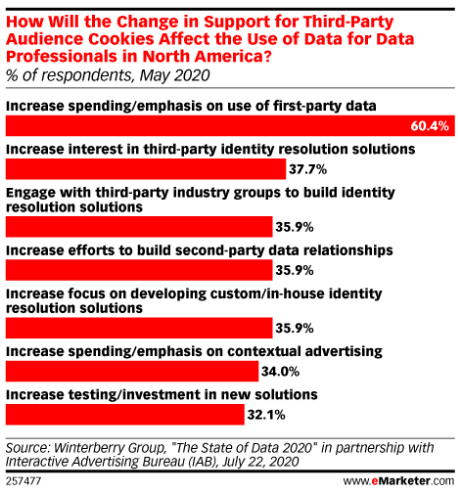Marketers, publishers and advertising technology companies have sought ways to wean themselves off third-party cookies as makers of web browsers, especially Apple and Google, end support for the audience tracking technology. While consumers are mindful of privacy, they’re likely to miss a technology that provides many conveniences for people as they use the internet.
“We’ll look back two years from now, and consumers will say, ‘I wish we just had cookies again, because I can delete those — and I didn’t have to log in and hit ‘accept’ on every site I go to,'” Jay Friedman, president of data-driven advertising agency Goodway Group, said in this interview with Matt Spiegel, executive vice president of marketing solutions and head of media vertical at TransUnion.
Google this year announced it would end support for third-party cookies, which are data files that websites put on browsers to help track consumers’ online activities, in its Chrome browser by 2022. Because Chrome is a popular way for consumers to use the internet, Google has a significant effect on the digital advertising industry.
Source: eMarketer, Winterberry Group
If the loss of third-party cookies in Chrome weren’t enough of a challenge, Apple this year said an updated version of the software that runs its iPhone, iPad and Apple TV streaming devices will show an opt-in alert. The notification will tell Apple customers when apps want access to the Identifier for Advertisers (IDFA), a randomized number the company assigns to its devices that helps to track audiences and serve targeted ads in apps. Apple had planned to implement the change this year, but pushed back the date to early next year to help app developers prepare.
As these changes hinder audience tracking, consumers may become more frustrated with ads that aren’t targeted, but are still intrusive, Friedman said.
“If unaided, consumers would rather see ads that are relevant to them — because you’re going to see ads either way,” he said.
More First-Party Data
First-party data that consumers share directly with advertisers and publishers will become more valuable in marketing communications as the third-party cookie becomes diminished.
“It forces everyone to get their first-party data in order,” Friedman said. “When before, we really didn’t know the name of the person we were targeting very often. Now, we will.”
Measuring the effectiveness of campaigns will still be a priority, even it is more challenging without third-party cookies. Friedman said advertisers and their agencies will continue to use the tools they have, while developing new tools on a parallel track.
“Getting our first-party data in order as a marketer is a no-brainer, regardless of what happens,” Friedman said. “Getting comfortable with the idea of incrementality as a metric is a good idea, regardless of what happens.”
You are watching “The New Media Reality: A Consumer-Centric View of Identity and Personalization Emerges,” a Beet.TV leadership series presented by TransUnion. For more videos, please click here.







































